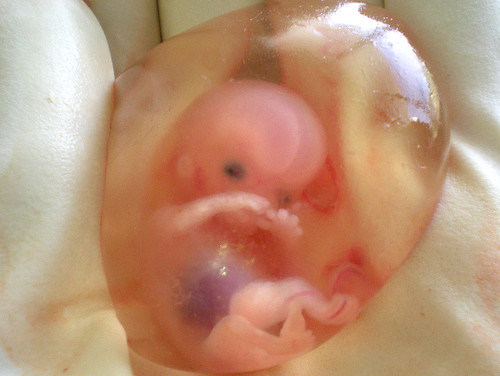We run our website the way we wished the whole internet worked: we provide high quality original content with no ads. We are funded solely by your direct support. Please consider supporting this project.
Did Jesus Have Two Minds?
As I laid out in the previous post, I believe Jesus is fully God and fully human. The question is: How is this possible? How do we talk about the way that Jesus was fully God and fully man?
The Creed of Chalcedon (451) tries to answer the question this way:
We, then, following the holy Fathers, all with one consent, teach men to confess one and the same Son, our Lord Jesus Christ, … truly God and truly man, … to be acknowledged in two natures, inconfusedly, unchangeably, indivisibly, inseparably; the distinction of natures being by no means taken away by the union, but rather the property of each nature being preserved, and concurring in one Person and one Subsistence, not parted or divided into two persons…
While the Creed defends against basic Christological heresies of the early Church, it actually does not answer our question. It just sets the boundaries that must be observed to avoid heresy. We must still make sense of the incarnation within these boundaries.
The way most theologians in the church tradition have done this, at least as it concerns the question of Jesus’ knowledge, is often called a “two minds Christology.” This view holds that Jesus walked the earth with both the all-knowing mind of God and the limited knowledge of a human being. And one could argue that the Bible supports this claim. Jesus occasionally demonstrated an omniscient awareness of people’s innermost thoughts and motives (Jn 2:24-25; Mt 9:4). He expressed a divine knowledge of Judas’ deceitful heart and future betrayal (Jn 13:18-19, 21-27), of Peter’s future denial (Lk 22L31-34) and the exact mode of his death (Jn 21:18-19), of a stranger who would open up his house to him and his disciples (Mk 14:12-16), and of a coin that would be found in a fish’s mouth (Mt 17:24-27). At the same time, as a full human being, Jesus often indicates that his knowledge was limited. So, this tradition concludes, Jesus somehow simultaneously possessed “two minds”: a divine omniscient mind and a human finite mind.
This view is not without its problems. To be honest, I have always had trouble rendering this view coherent. It requires us to imagine that Jesus was aware of what was happening with every molecule on every planet in the universe even while he was a zygote in the womb of Mary. And it requires that we imagine this while also affirming that, as a fully human zygote, Jesus was completely devoid of any awareness. Is this a legitimate paradox or an unacceptable contradiction? One could easily argue the latter. If being God means that one is omniscient and that being human means that one is not omniscient, then it seems we are asserting A and not A in claiming Jesus was both. We could argue along the same lines regarding God’s omnipresence and omnipotence. And if this is true, then in asserting that Jesus was a single person who was fully God (and thus fully omniscient) and full human (and thus not fully omniscient), we are asserting nothing, just as when we say “married bachelor” or “round triangle.”
There is an alternative way of talking about how Jesus was fully God and fully human, however. It has been labeled the “kenotic Christology,” based on the word kenosis, which is Greek for “to empty.” More specifically, it is based on Philippians 2:7. In my next post, I’ll begin with a discussion of this passage.
If you want to read a basic introduction to the Classical view of the Incarnation, I recommend G. Boyd, P. Eddy, Across the Spectrum, (Grand Rapids, MI: Baker Academic, 2009), 111.
Category: Essays
Tags: Essay, God, Incarnation, Jesus, Kenosis, Omniscience, The Mind
Topics: Christology
Related Reading

Why Did Jesus Curse the Fig Tree?
One of the strangest episodes recorded in the Gospels is Jesus cursing a fig tree because he was hungry and it didn’t have any figs (Mk 11:12-14; Mt 21:18-19). It’s the only destructive miracle found in the New Testament. What’s particularly puzzling is that Mark tells us the reason the fig tree had no figs…

God’s Kind of Holy War
This is part three of a series on Revelation. You can find part one here and part two here. While there will come a day when the sacrificial victory of the Lamb and of his people will be apparent to all (5:13; 15:4; 21: 23-4), only to those who embrace the perspective of the heavenly…

Getting Free From the Sin of Sodom: Living With Outrageous Generosity
Greed is a bottomless pit which exhausts the person in an endless effort to satisfy the need without ever reaching satisfaction. Erich Fromm Jesus, the poor and the greedy Though it’s often missed by American Christians, confronting poverty was central to everything Jesus was about. Jesus didn’t just care about the poor. Though he was…

9 Things That Are True of Us When We’re Saved
Image by rAmmoRRison via Flickr The New Testament has many amazing things to say about who we are as believers because of what Christ has done for us. When the Lord saves us, he doesn’t just rescue us from eternal death; he gives us a completely new identity. Consider what happens to us when the Father…

Jesus is the Center of the Story
The previous post addressed how the revelation of Christ is the surprising twist that reframes how we must read all that precedes it. Today we’ll look briefly at five supports to this claim. Jesus said, “I have a testimony greater than that of John” (John 5:36). Jesus elsewhere claims that “among those born of women…

A Brief Outline and Defense of the Open View
While many Christians have found the open view of the future to be the most helpful and accurate view of God’s foreknowledge of the future based on biblical, philosophical, and experiential evidence, others have criticized the view as unorthodox and even heretical. What follows is a brief description and defense of the open view prepared…

